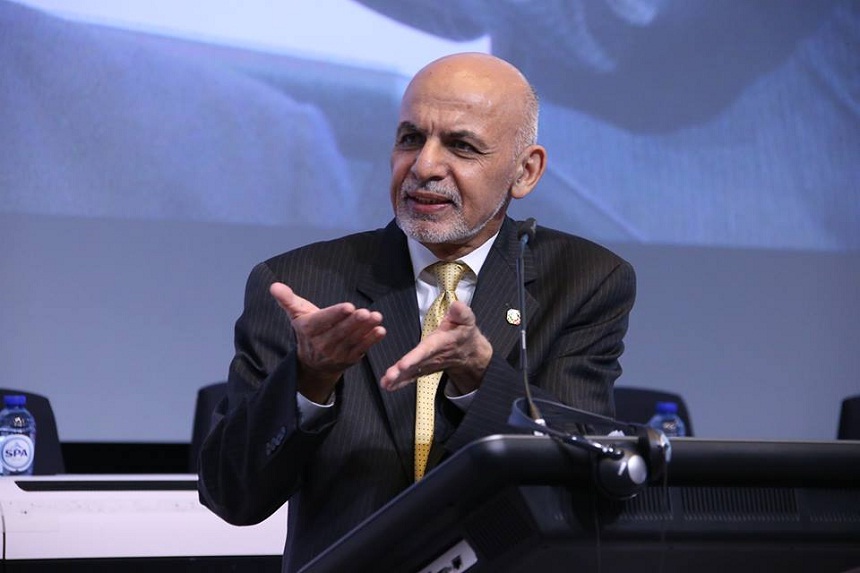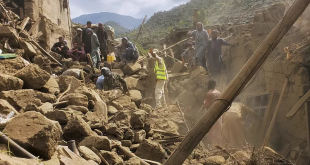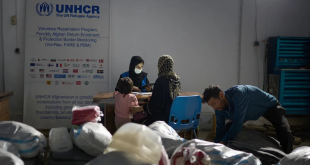Afghan president Ashraf Ghani referred to Pakistan nine times in his 36-minute speech at the Kabul Process conference on June 6, a one-day meeting between the Afghan government and representatives of 27 countries and international organizations charged with restarting a peace process in this violence-torn country. While Ghani’s central demand was to urge the world community to act on its “promise” to fight terrorism and help Afghans in responding to the threat of terror, he stressed on Islamabad’s disinclination to genuinely commit itself to peace in Afghanistan.
He desperately urged Pakistan, once again, “to propose its agenda and a mechanism” for joint political efforts which can “lead to peace” in Afghanistan. But wasn’t this the right time and occasion for Ghani to share his own spy agency’s intelligence, that the Haqqani terror network, with “the direct guidance and assistance from Pakistan”, had carried out the recent massive bomb attack in Kabul, which killed over 150 Afghans and injured hundreds more?
Question is, does the Afghan government have accurate, actionable and relevant intelligence in this regard? In fact, does Washington have the specific intelligence or not to conclude whether Pakistan was involved in the May 31st deadly terrorist attack in Kabul? But Ghani seemed to let Pakistan off the hook. Instead of stating that “we cannot figure out what is it that Pakistan wants” or asking what it takes “to convince Pakistan that a stable Afghanistan helps them and helps our region”, the President must realize that all Afghans want is to urge Washington and the international community to fix or capture the Haqqani Network and the Taliban leaderships in Pakistan.
Begging for peace and cooperation from Islamabad means that the Afghan president, a steadfast US ally, is desperate and has failed to push for a shift in Washington’s strategic thinking vis-a-vis Pakistan.
Offering an olive branch to Pakistan
On November 14, 2014, shortly after assuming the presidency, in an effort to appease Islamabad, Ghani visited the General Headquarters of the Pakistan Army in Rawalpindi. His message to the Generals was, “Afghanistan wants to bolster security and defence ties with Pakistan”.
Over the next few weeks, a series of closed-door meetings were held between Afghanistan’s National Security Advisor, Mr Hanif Atmar, and Pakistan’s military and spy agency chiefs in Kabul as well as outside the country — in UK, UAE, China and Saudi Arabia.
President Ghani met the Pakistan military and spy chiefs in Kabul and Saudi Arabia, while Atmar met them in Kabul, UK, UAE and China. When the President and his NSA met them in Kabul on November 10, 2014, the Afghan leaders even asked their own intelligence agency’s head, Mr Rahmatullah Nabil, to wait outside as the “the ISI chief did not want him to be in the meeting”.
President Ghani established a hotline with the erstwhile Pakistan army chief, General Raheel Sharif and his NSA. Atmar set up another hotline with Lt. Gen. Rizwan Akhtar Baig, the then director-general of the ISI. In this new chapter of apparently warm relations, Afghan cadets were sent for military training to Pakistan. The Afghan president allowed Pakistani intelligence officers to interrogate prisoners in Afghan prisons. Under the name of “joint military operations”, Pakistani forces were given Kabul’s consent to conduct selective operations in different parts of Afghanistan.
Ghani went even further. He even described Pakistani state-supported terrorism in Afghanistan as a “proxy war” between India and Pakistan. Then in May 2015, Ghani authorized the inking of a secret intelligence cooperation agreement between Afghanistan’s National Directorate of Security (NDS) and Pakistan’s Inter-Services Intelligence (ISI).
All President Ghani wanted and hoped for in return was the genuine start of peace talks with the Taliban and a change in the Pakistan military’s mindset, so that Afghanistan could bring an end to the war and the violence that has ripped this country apart for nearly four decades.
Speaking at the Kabul Process conference on June 6, President Ghani gave voice to his efforts. “From the day I took office, I went far out on a limb to offer an olive branch to Pakistan. But it has not been taken.”
Indeed, with a green light from the Americans and the British, Ghani’s policy of appeasement and offer of “an olive branch to Pakistan” not only resulted in the deterioration of the security situation in the country and the region, but also distanced many Afghans from the
National Unity Government and widened the war in the country.
Fighting Pakistan in Afghanistan
But as Kabul’s efforts to cultivate a genuine friendship and true cooperation with Islamabad failed, Ashraf Ghani waged an intensifying military campaign in Afghanistan, against an enemy whose sanctuary, training ground, supportive system and network were in Pakistan.
In his public statements, he stated that Pakistan is in a state of “undeclared war” with Afghanistan. But, in line with US military
strategy in Afghanistan, Ghani ordered Afghan security and defense forces to apply an unprecedented level of force against the Taliban.
Within a year, tens of thousands of military operations were conducted by Afghan security forces inside the country. US forces were also given a free hand in conducting their own military campaign, to fight a threat which nevertheless had its origin outside Afghanistan.
Drone strikes, house searches and the illegal detention of Afghans by US forces soon became the order of the day — Ghani signed a decree to allow detention without trials of terror suspects. It is worthwhile to point out here that none of these measures by US forces had earlier been authorized by former Afghan president Hamid Karzai.
Yet, waging more war within Afghanistan proved counterproductive to the rapidly deteriorating security situation in the country. Washington and Kabul’s nearsighted war policy gave birth to new terrorist brands such Daesh or ISIS in Afghanistan.
Soon the province of Kunduz and several other important districts repeatedly fell to the Taliban and foreign-backed terrorists. But simultaneously, the number of foreign fighters increased from 200 to 11,000 fighters in these past two years – these figures have been given by President Ghani himself. Meanwhile, civilian casualties and the death rate of Afghan security forces rose to an all
time high.
Trying Pakistan again
Fast-forward two and half years. Ashraf Ghani now says his “top priority must go to finding an effective way to build a different relationship with Pakistan.” He told the participants of the Kabul Process conference: “We want to be able to trust Pakistan.” The Afghans feel as if they have been struck by thunder. As if the experience of the last two and a half years hasn’t been enough. But if the President is still looking for answers to “what is it that Pakistan wants” from Afghanistan, he is simply playing with people’s emotions.
Mr President, perhaps I can tell you what Pakistan wants! Pakistan wants to control Afghanistan’s foreign policy, especially with regard to India. It wants the recognition of the Durand line by the Afghans and an Islamabad-centric government in Kabul. But here is something else, Mr President ! All of this is a dream which will never come true!
We should clearly call upon the region and the world to tackle the political dimensions of terrorism and end support to states who sponsor terrorism. Today, the Frankenstein’s monster – the terrorist and extremist outfits in Afghanistan — are as much a creation of the US as it is of the Pakistan. The Pakistani military establishment continues to serve the US in securing its strategic interests in south and central Asia.
In pursuit of their strategic and geopolitical agendas, foreign states continue to use terrorist groups in Afghanistan and the region. But the truth is that there will be no change in Pakistan’s double-sided policy towards Afghanistan, unless there is a strategic shift in Washington’s policy in dealing with Islamabad and in its dealing with Pakistan-sponsored terrorism at the same time.
Aimal Faizi is a former spokesperson to ex-Afghan president Hamid Karzai
 Afghanistan Times
Afghanistan Times




